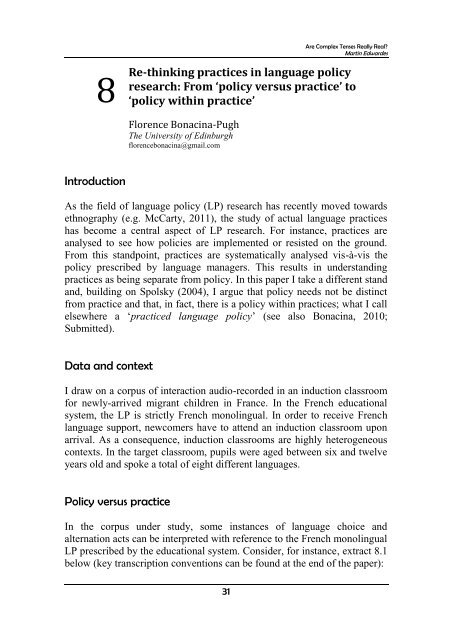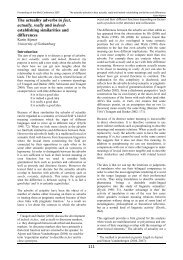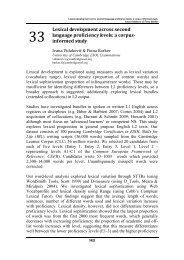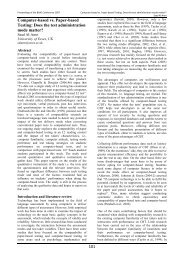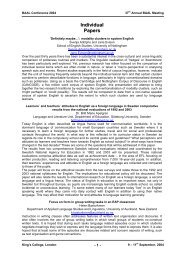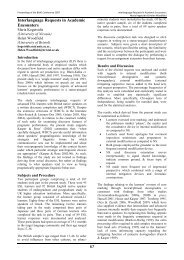Proceedings of the - British Association for Applied Linguistics
Proceedings of the - British Association for Applied Linguistics
Proceedings of the - British Association for Applied Linguistics
Create successful ePaper yourself
Turn your PDF publications into a flip-book with our unique Google optimized e-Paper software.
8<br />
Introduction<br />
31<br />
Are Complex Tenses Really Real?<br />
Martin Edwardes<br />
Re-thinking practices in language policy<br />
research: From ‘policy versus practice’ to<br />
‘policy within practice’<br />
Florence Bonacina-Pugh<br />
The University <strong>of</strong> Edinburgh<br />
florencebonacina@gmail.com<br />
As <strong>the</strong> field <strong>of</strong> language policy (LP) research has recently moved towards<br />
ethnography (e.g. McCarty, 2011), <strong>the</strong> study <strong>of</strong> actual language practices<br />
has become a central aspect <strong>of</strong> LP research. For instance, practices are<br />
analysed to see how policies are implemented or resisted on <strong>the</strong> ground.<br />
From this standpoint, practices are systematically analysed vis-à-vis <strong>the</strong><br />
policy prescribed by language managers. This results in understanding<br />
practices as being separate from policy. In this paper I take a different stand<br />
and, building on Spolsky (2004), I argue that policy needs not be distinct<br />
from practice and that, in fact, <strong>the</strong>re is a policy within practices; what I call<br />
elsewhere a ‘practiced language policy’ (see also Bonacina, 2010;<br />
Submitted).<br />
Data and context<br />
I draw on a corpus <strong>of</strong> interaction audio-recorded in an induction classroom<br />
<strong>for</strong> newly-arrived migrant children in France. In <strong>the</strong> French educational<br />
system, <strong>the</strong> LP is strictly French monolingual. In order to receive French<br />
language support, newcomers have to attend an induction classroom upon<br />
arrival. As a consequence, induction classrooms are highly heterogeneous<br />
contexts. In <strong>the</strong> target classroom, pupils were aged between six and twelve<br />
years old and spoke a total <strong>of</strong> eight different languages.<br />
Policy versus practice<br />
In <strong>the</strong> corpus under study, some instances <strong>of</strong> language choice and<br />
alternation acts can be interpreted with reference to <strong>the</strong> French monolingual<br />
LP prescribed by <strong>the</strong> educational system. Consider, <strong>for</strong> instance, extract 8.1<br />
below (key transcription conventions can be found at <strong>the</strong> end <strong>of</strong> <strong>the</strong> paper):


